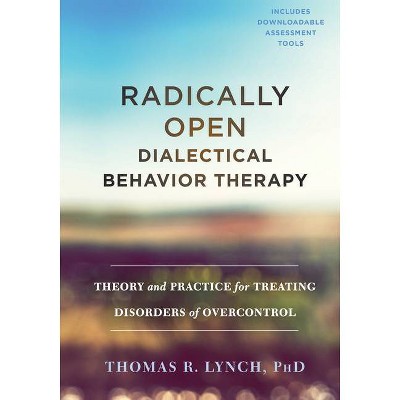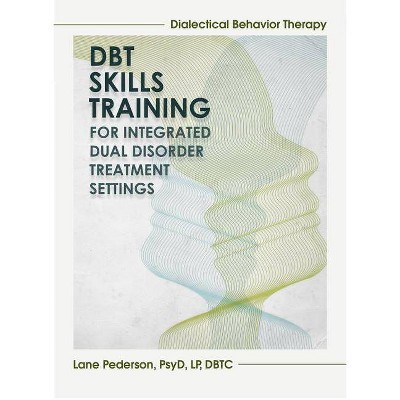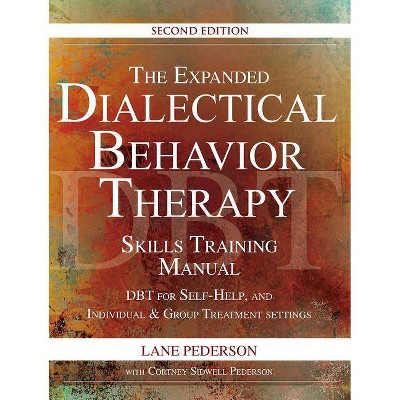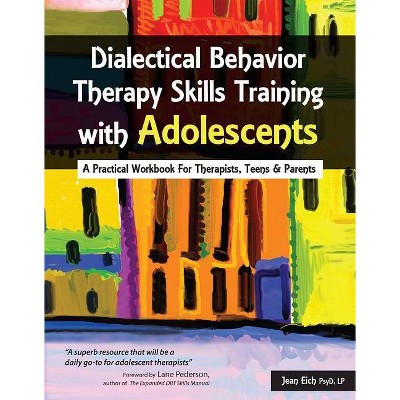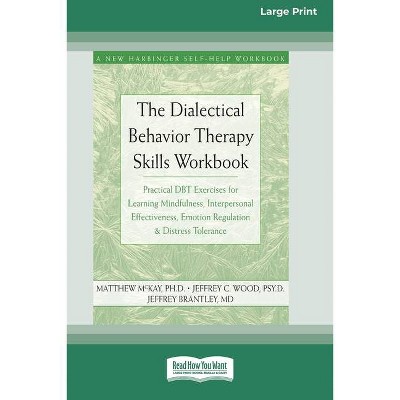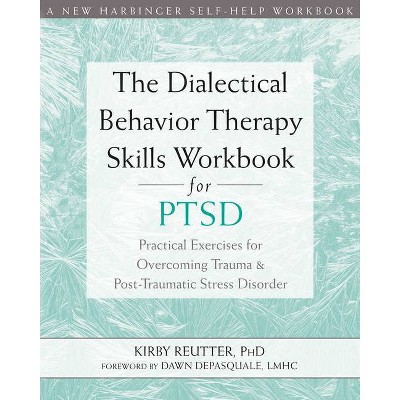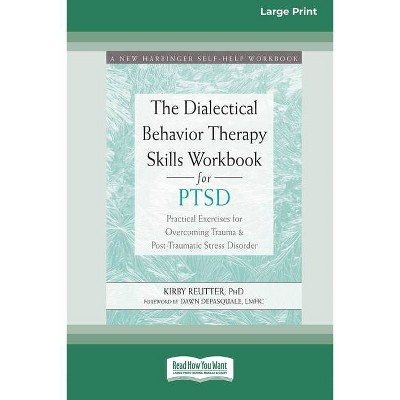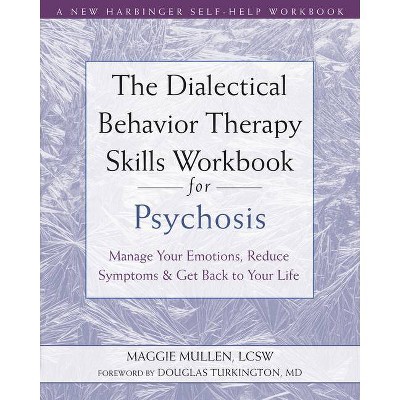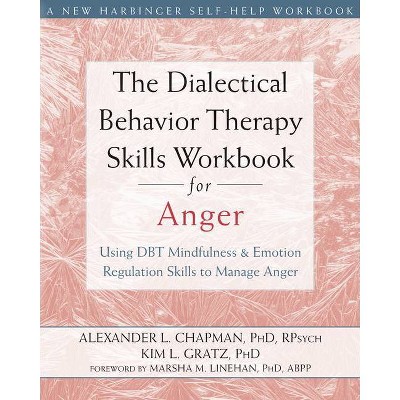The Skills Training Manual for Radically Open Dialectical Behavior Therapy - by Thomas R Lynch (Paperback)
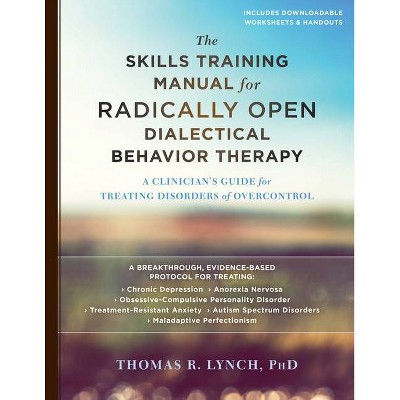
Similar Products
Products of same category from the store
AllProduct info
<p/><br></br><p><b> About the Book </b></p></br></br><i>The Radically Open Dialectical Behavior Therapy Skills Training Manual</i> offers a groundbreaking, transdiagnostic approach for clients with difficult-to-treat overcontrol (OC) disorders, such as anorexia nervosa, treatment-resistant depression, and obsessive-compulsive disorder (OCD). Written by the founder of RO-DBT and published for the first time, this manual offers clinicians step-by-step guidance for implementing this evidence-based therapy in their practice.<p/><br></br><p><b> Book Synopsis </b></p></br></br><p>Radically open dialectical behavior therapy (RO DBT) is a groundbreaking, transdiagnostic treatment model for clients with difficult-to-treat overcontrol (OC) disorders, such as anorexia nervosa, chronic depression, and obsessive-compulsive disorder (OCD). Written by the founder of RO DBT, Thomas Lynch, this is the first and only session-by-session training manual to help you implement this evidence-based therapy in your practice.</p><p>As a clinician, you're familiar with dialectical behavioral therapy (DBT) and its success in treating clients with emotion dysregulation disorders. But what about clients with <i>overcontrol</i> disorders? OC has been linked to social isolation, aloof and distant relationships, cognitive rigidity, risk aversion, a strong need for structure, inhibited emotional expression, and hyper-perfectionism. And yet--perhaps due to the high value our society places on the capacity to delay gratification and inhibit public displays of destructive emotions and impulses--problems linked with OC have received little attention or been misunderstood. Indeed, people with OC are often considered highly successful by others, even as they suffer silently and alone.</p><p>RO DBT is based on the premise that psychological well-being involves the confluence of three factors: receptivity, flexibility, and social-connectedness. RO DBT addresses each of these important factors, and is the first treatment in the world to prioritize social-signaling as the primary mechanism of change based on a transdiagnostic, neuroregulatory model linking the communicative function of human emotions to the establishment of social connectedness and well-being. As such, RO DBT is an invaluable resource for treating an array of disorders that center around overcontrol and a lack of social connectedness--such as anorexia nervosa, chronic depression, postpartum depression, treatment-resistant anxiety disorders, autism spectrum disorders, as well as personality disorders such as avoidant, dependent, obsessive-compulsive, and paranoid personality disorder.</p><p>In this training manual, you'll find an outline of RO DBT, including history, research, and how it differs from traditional DBT. You'll also find a session-by-session RO DBT outpatient treatment protocol, with sections that outline the weekly, one-hour individual therapy sessions and weekly two-and-a-half hour skills training classes that occur over a period of approximately thirty weeks. This includes instructor guidelines and user-friendly worksheets.</p><p>The feasibility, acceptability, and efficacy of RO DBT is evidence-based and informed by over twenty years of translational treatment development research. This important manual--along with its companion book, <i>Radically Open Dialectical Behavior Therapy</i> (available separately), distills the essential components of RO DBT into a workable program you can start using right away to improve treatment outcomes for clients suffering with OC.</p><p/><br></br><p><b> Review Quotes </b></p></br></br><br>"A new and comprehensive statement from one of the more creative minds in evidence-based clinical intervention today, RO DBT brings together a contemporary focus on a limited set of key transdiagnostic processes, with new assessment and intervention techniques for moving them in a positive direction. Emphasizing flexibility, openness, connection, and attention to social signaling, RO DBT specifies the details that can matter, from how you arrange your consulting room furniture to how nonverbal cues signal social information. RO DBT seems destined to make an impact on evidence-based care in many corners of clinical work. Highly recommended." <br><b>--Steven C. Hayes, PhD</b>, codeveloper of acceptance and commitment therapy (ACT); Foundation Professor of psychology at the University of Nevada, Reno; and author of <i>Get Out of Your Mind and Into Your Life</i>--Steven C. Hayes, PhD<br><br>"Radically open dialectical behavior therapy (RO DBT) is a truly innovative treatment, developed through translation of neuroscience into clinical practice, integrating various influences from dialectical behavior therapy (DBT), mindfulness-based approaches, emotion, personality and developmental theory, evolutionary theory, and Malamati Sufism. RO DBT is applicable to a spectrum of disorders characterized by excessive inhibitory control or <i>overcontrol</i> (OC). This is the first treatment that directly targets social signaling and nonverbal aspects of communication not only in clients but also in therapists. ... This book on the theory and practice of RO DBT, together with the skills training manual that describes the content of skills classes, are excellent guides for clinicians who want to embark in delivering transdiagnostic treatments based on science and clinical practice." <br><b>--Mima Simic, MD, MRCPsych</b>, joint head of the child and adolescent eating disorder service, and consultant child and adolescent psychiatrist at the Maudsley Hospital in London, UK--Mima Simic, MD, MRCPsych<br><br>"RO DBT offers an intriguing reconceptualization of traditional views of internalizing and externalizing disorders, and provides the clinician with valuable new tools to address a number of problems that have been particularly resistant to standard CBT approaches. I will definitely include RO DBT theory and techniques in my graduate-level intervention class. I know beginning clinicians in particular will be grateful to have a systematic way to approach these slow-to-warm-up clients who are difficult to establish rapport with. Their early termination from therapy and failure to respond to traditional approaches often leaves clinicians befuddled and critical of their own skills. RO DBT provides a compassionate way for clinicians to view this type of resistant client, as well as to work on some areas that are likely to benefit them. A very welcome addition to any clinician's toolbox." <br> --<b>Linda W. Craighead, PhD</b>, professor of psychology and director of clinical training at Emory University, and author of <i>The Appetite Awareness Workbook</i>--Linda W. Craighead, PhD<br><p/><br></br><p><b> About the Author </b></p></br></br><b>Thomas R. Lynch, PhD, FBPsS</b>, is professor emeritus of clinical psychology at the University of Southampton school of psychology. Previously, he was director of the Duke Cognitive-Behavioral Research and Treatment Program at Duke University from 1998-2007. He relocated to Exeter University in the UK in 2007. Lynch's primary research interests include understanding and developing novel treatments for mood and personality disorders using a translational line of inquiry that combines basic neurobiobehavioral science with the most recent technological advances in intervention research. He is founder of radically open dialectical behavior therapy (RO DBT). <p/> Lynch has received numerous awards and special recognitions from organizations such as the National Institutes of Health-US (NIMH, NIDA), Medical Research Council-UK (MRC-EME), and the National Alliance for Research on Schizophrenia and Depression (NARSAD). His research has been recognized in the Science and Advances Section of the National Institutes of Health Congressional Justification Report; and he is a recipient of the John M. Rhoades Psychotherapy Research Endowment, and a Beck Institute Scholar.
Price History
Cheapest price in the interval: 59.95 on October 27, 2021
Most expensive price in the interval: 59.95 on February 4, 2022
Price Archive shows prices from various stores, lets you see history and find the cheapest. There is no actual sale on the website. For all support, inquiry and suggestion messages communication@pricearchive.us
